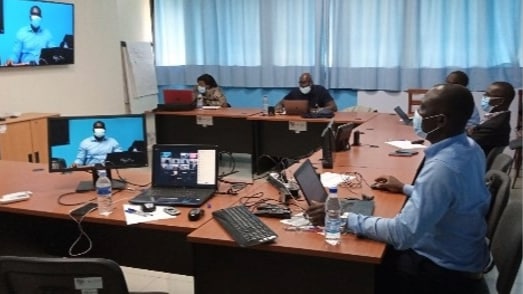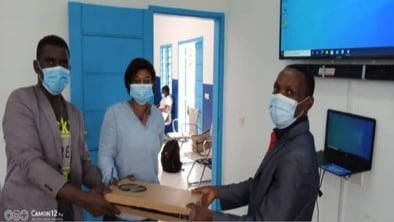At a glance
- Côte d'Ivoire faced challenges in responding to COVID-19 due to a shortage of trained personnel and safety concerns for responders.
- The CDC Foundation helped conduct 16 online rapid response training sessions, benefiting 63 individuals.
- The program improved stress management and response efficacy, thereby strengthening the overall COVID-19 response.
Strengthening Côte d'Ivoire's COVID-19 Response through Training and Preparedness

Fact
Yavo explained the importance of having a trained and ready-to-respond COVID-19 workforce in this West African country. The pandemic highlighted the need to train frontline workers in remote communities and coordinate COVID-19 response efforts across Côte d'Ivoire.
The country's first COVID-19 case was on March 11, 2020. Early in the pandemic, responders did not follow up on half of COVID-19 cases because they lacked training and did not know how to thoroughly complete disease investigation forms. Additionally, concerns about responder safety underscored the critical need for training that would bolster readiness and resilience of COVID-19 Rapid Response Teams (RRTs) in Côte d'Ivoire. With funding from the Bill & Melinda Gates Foundation (BMGF), the CDC Foundation worked with CDC's Emergency Response Capacity Team (ERCT) to identify and virtually support countries with COVID-19 rapid response training.
Remote Communities, Remote Connections
Côte d'Ivoire's INSP e-health center previously used Project ECHO (Extension for Community Healthcare Outcomes), a video conferencing platform, to connect with its 113 health districts. INSP repurposed the video conferencing system from its original use in HIV response to something that could provide COVID-19 emergency response training.
INSP adapted a COVID-19 RRT training package developed by CDC and the World Health Organization. INSP, with Côte d'Ivoire's CDC Country Office and CDC ERCT support, worked with Côte d'Ivoire national experts and the health districts to define technical topics, modules, and evaluation for the trainings. These experts included personnel from Direction de La Formation et de la Recherche (Directorate of Training and Research), Direction de la Santé Communautaire (Directorate of Community Health), Direction de la Communication et des Relations Publiques (Directorate of Communication and Public Relations), Programme National de Santé Mentale (National Program of Mental Health), Task Force Percutaneous Coronary Intervention, and Institut Pasteur de Côte d'Ivoire (Pastor Institute of Côte d'Ivoire). Adaptations included adding local context and new topics to provide a comprehensive training. The modules focused on teaching COVID-19 responders how to be safe and effective. Topics included biological sampling, stress management, and ethical considerations to address critical areas of emergency response.
The project's launch included providing videoconferencing equipment and monthly credits for Internet access to 10 districts. BMGF funding helped increase access to remote districts by securing hotspot technology; strengthening Internet connections; and securing subscriptions, security systems, and computer equipment. By adapting the existing Project ECHO platform and providing additional technology, these trainings could be delivered to Côte d'Ivoire's COVID-19 RRTs in priority districts.
Training Delivery and Impact
Design and implementation took place from May to November 2020. Pilot training locations included four regions and 10 health districts. INSP organized 16 weekly online training sessions with at least 30 trainees per session. Trainees included doctors, veterinarians, data managers, and dentists. Local health directors recruited trainees in professions that met regional RRT needs and reflected the culture of their local institutes. Various public health professionals, from epidemiologists to mental health specialists, led the sessions.
In a June 2021 interview, Yavo said, "By using this platform, we can communicate in real time providing equipment, supplies, and communication between the trainees – reinforcing the entire health system."
Since the training, 63 participants have been working as COVID-19 rapid responders in the field. RRT responders reported feeling better equipped to manage stress because of the additional training. Modules were made available to RRTs to further educate other local public health professionals. Sharing the training increased partner knowledge of the project in the 10 priority districts and strengthened the overall COVID-19 response in the country.
Bright Future for Remote Response

Côte d'Ivoire received additional BMGF funding through the CDC Foundation to conduct training in other remote districts deemed "COVID-19 hotspots."
CDC's innovative training approach allowed INSP to reach remote communities and create a network of frontline responders across Cote d'Ivoire. Serigne Ndiaye, former CDC Global Health Security Agenda (GHSA) Côte d'Ivoire country program director, said, "Because the system can reach out to all districts and teams and work with them in real time, it's improved contact tracing, but can go even further and support a vaccination campaign with up-to-date information."
The project's sustained impact enabled the use of technology to communicate updated COVID-19 guidance, conduct other trainings, and communicate with staff at the national level. The technology has been used for other public health emergencies such as Ebola.
CDC's ERCT continues to support development of a sustainable RRT program for the country by providing RRT management guidance to help streamline operations and improve response coordination. Partnering with CDC and its country office, INSP and its national partners are confident they're ready to prevent, detect, and respond to the next public health emergency.
